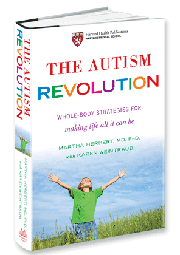Some people, particularly in the neurodiversity community, consider autism to be another way of being human, a natural variant of humanness and cultural interaction that is different but not aberrant.
Here are some links:
- Special issue of the Disability Studies Quarterly on autism and neurodiversity: http://dsq-sds.org/issue/view/43
- the article by Judy Singer that is generally cited as the source of the term “neurodiversity”: Singer, Judy. 1999. “Why Can’t You Be Normal for Once in Your Life? From a ‘Problem with No Name’ to the Emergence of a New Category of Difference.” In Mairian Corker and Sally French, Eds., Disability Discourse. Buckingham, UK: Open University Press, 59-67
- Summary of neurodiversity key points: http://www.thomasarmstrong.com/neurodiversity.php
- Link to Maarsma & Wellin paper and bibliography on Mendeley
- Some scholars studying or influenced by or working with neurodiversity
- Francisco Ortega – how ideas about neurological differences are employed by self-advocates
- Michael Orsini
- Kristin Bumiller: Quirky citizens: autism, gender and reimagining disability
- Morton Ann Gernsbacher
- Richard Grinker – book: Unstrange Minds – http://unstrange.com/
- Some organizations
- G.R.A.S.P.
- Autism Self-Advocacy Nework
- Autism Network International, ANI
- Some blogs
- Michele Dawson http://autismcrisis.blogspot.com/
- Kristina Chew http://autism.typepad.com/
- Estee Klar http://www.esteeklar.com/
- Some news stories
- Andrew Solomon The Autism Rights Movement New York Magazine article May 25, 2008
- Amy Harmon Neurodiversity Forever; The Disability Movement Turns to Brains, New York Times May 9, 2004
This point of view forcefully highlights the biases in the neurotypical culture toward considering the neurotypical type of “normality” as a self-evidently obvious endpoint toward which people with autism should aspire. This bias is associated with disrespect and insensitivity. It also leads to actions that may not be effective even within the framework of the neurotypical goal structure. These include
- clinical interventions based on assumptions such as impairment, mental retardation or oppositional motivations for behavior
- research paradigms that assume rather than test underlying biases and thus miss important insights
Sympathetic critics of this point of view argue that that this approach to autism falls short on a few levels:
- it may be more applicable to “high-functioning” people with autism who are able to represent their own points of view through language or other means of communication accessible to other people
- It may interfere with attention to “surplus” problems that weigh down people with autism, such as medical problems or lack of useful skills that are learnable
Questions about autism as a cultural variant and gene-environment influences:
- How much does this point of view depend upon the assumption that autism is highly genetic?
- How much does this argument relate more to high functioning individuals?
- If it were shown that autism can have strong environmental contributors or causes, would this lead to modifications of this position? What modifications would work to maintain the important emphasis on the value and uniqueness of the autism perspective?


